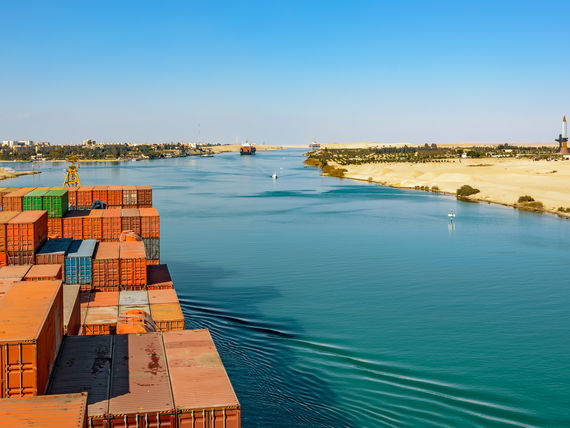Red Sea attacks impacting shipping in the Suez Canal

Attacks launched by Yemen's Houthi group on commercial ships at the southern end of the Red Sea have prompted several shipping companies to divert vessels, avoiding a route that would take them through Egypt's Suez Canal in the north and its link to the Mediterranean Sea. The Houthi group said it launched a drone attack on two cargo vessels in the area on Monday, the latest in a series of missile and drone strikes on shipping which it says are a response to Israel's assault on the Gaza Strip.
The Iran-aligned group says the aim of the attacks is to support the Palestinians as Israel and Hamas wage war.
The re-routing adds cost and time to vessel journeys. Oil prices and war risk insurance premiums have spiked as a result.
U.S. Defense Secretary Lloyd Austin, speaking on a visit to Israel, said Washington was building a coalition to address the Houthi threat and said defence ministers from the region and beyond would hold virtual talks on the issue on Tuesday.
Norway said it was ready to provide naval officers, while other NATO states said they were ready to consider support.
About 15% of world shipping traffic transits via the Suez Canal, the shortest shipping route between Europe and Asia.
Several major freight firms -- including MSC -- have begun to sail around Africa instead, adding costs and delays which are expected to be compounded over coming weeks, according to industry analysts.
London's marine insurance market widened the area in the Red Sea it deemed high risk on Monday, adding to premiums ships pay.
The war between Israel and Hamas, which began on Oct. 7, has sent shockwaves through the region and threatened to cause a broader conflict.
WHAT'S THE IMPACT ON CANAL NAVIGATION SO FAR?
-
On Dec. 17, the Suez Canal Authority (SCA) said that since Nov. 19, 55 ships have rerouted via the Cape of Good Hope, while 2,128 have passed through the canal in the same period.
-
Two major freight firms including MSC, the world's biggest container shipping line, said on Saturday they would avoid the Suez Canal as Houthi militants stepped up their assaults.
-
SCA Chairman Osama Rabie said that on Dec. 17, 77 ships passed through the canal, including some ships belonging to shipping lines that had announced temporary diversions. Those were vessels that were already in the Red Sea region before the announcements were made.
Reuters
More shipping companies have announced avoiding the Suez Canal and changing course for sailing around the Cape of Good Hope. For those beneficial cargo owners (BCOs) with time-sensitive goods on these vessels that have detoured, replacement shipments via air transportation is one contingency option to be actively considered at this time. Alternative routings via rail also help keep cargo moving with the uncertainty in the Red Sea. BCOs should also anticipate further schedule changes on future sailings based on the extended transit time of these impacted vessels.
If you have any questions on specific shipments, please reach out to your local PSA BDP representative.


